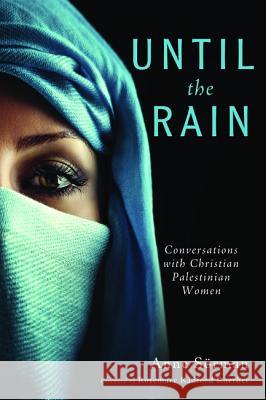Until the Rain » książka
Until the Rain
ISBN-13: 9781498207003 / Angielski / Miękka / 2015 / 90 str.
Until the Rain
ISBN-13: 9781498207003 / Angielski / Miękka / 2015 / 90 str.
(netto: 61,54 VAT: 5%)
Najniższa cena z 30 dni: 64,44
ok. 16-18 dni roboczych
Dostawa w 2026 r.
Darmowa dostawa!
The Second Book of Samuel in the Hebrew Bible tells of a woman named Rizpah whose sons are sacrificed in the power struggle between the houses of Saul and David: Then Rizpah the daughter of Aiah took sackcloth, and spread it on a rock for herself, from the beginning of harvest until rain fell on them from the heavens; she did not allow the birds of the air to come on the bodies by day, or the wild animals by night. (2 Sam 21:10) Was Rizpah driven by the depths of despair? Or was she protesting in a woman's silent anger? The same kind of quiet defiance is playing itself out in contemporary Palestine. Is it grief or resistance--or the foundation of a new theology? ""Sorman's stories are deeply moving and give a vivid sense of what life under occupation means for Palestinian women, especially those who can relate it to theological reflection and biblical interpretation. Most deeply, the book reflects her many years of sharing in the daily life of Palestinians, especially women, and what the occupation means for those living under it from day to day."" --Rosemary Radford Ruether, from the Foreword Anne Sorman is a Swedish journalist, author, and Lutheran minister. Based on her encounters with Palestinian women, theologians, and activists, she traces the possible outlines of a contemporary Palestinian theology.
The Second Book of Samuel in the Hebrew Bible tells of a woman named Rizpah whose sons are sacrificed in the power struggle between the houses of Saul and David: Then Rizpah the daughter of Aiah took sackcloth, and spread it on a rock for herself, from the beginning of harvest until rain fell on them from the heavens; she did not allow the birds of the air to come on the bodies by day, or the wild animals by night. (2 Sam 21:10)Was Rizpah driven by the depths of despair? Or was she protesting in a womans silent anger? The same kind of quiet defiance is playing itself out in contemporary Palestine. Is it grief or resistance--or the foundation of a new theology?""Sormans stories are deeply moving and give a vivid sense of what life under occupation means for Palestinian women, especially those who can relate it to theological reflection and biblical interpretation. Most deeply, the book reflects her many years of sharing in the daily life of Palestinians, especially women, and what the occupation means for those living under it from day to day."" --Rosemary Radford Ruether, from the ForewordAnne Sorman is a Swedish journalist, author, and Lutheran minister. Based on her encounters with Palestinian women, theologians, and activists, she traces the possible outlines of a contemporary Palestinian theology.











